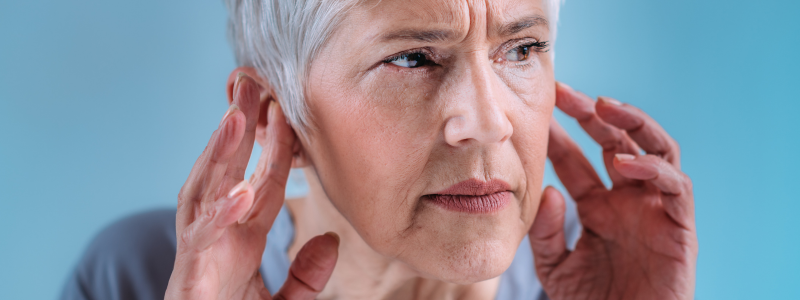Free home visits
with a local audiologist

Head of Online Medical Content

Audiology Expert at Hearing Aid UK

Sudden hearing loss is an abrupt decrease in hearing, often occurring within a few days. Causes may include viral infections, vascular issues, or inner ear disorders. Symptoms can include hearing loss in one or both ears, tinnitus, or dizziness. Prompt medical evaluation is crucial for potential treatment with steroids or other interventions.
In this article, we discuss the causes, risks, symptoms, and treatments available.
Sudden hearing loss is a serious and potentially debilitating condition that can occur without warning. It is defined as a hearing loss of at least 30 decibels in three or fewer days, usually affecting one ear.
What is the most common cause of sudden hearing loss? Sudden hearing loss can be caused by a variety of factors, including infection, inflammation, trauma and exposure to loud noise.
Because of this, it is important to seek medical attention immediately if you experience sudden hearing loss, as prompt treatment can improve outcomes and how successful the treatment will be.
Symptoms of sudden hearing loss can include a decrease in hearing in one ear, a feeling of fullness in the ear, tinnitus (ringing in the ear), and dizziness or vertigo. The onset of symptoms can be sudden and may occur during everyday activities, such as listening to music or watching television.
Infection: An ear infection can cause inflammation and swelling in the ear, leading to sudden hearing loss. For example, bacterial and viral infections can both cause sudden hearing loss. Prompt treatment with antibiotics or antiviral medication may be necessary to prevent further damage.
Trauma: Trauma to the head or ear can cause sudden hearing loss. This can be caused by a blow to the head, a fall, or exposure to a loud noise. In some cases, trauma can cause damage to the tiny hair cells in the inner ear that are responsible for detecting sound waves.
Autoimmune disorders: Some autoimmune disorders, such as lupus or rheumatoid arthritis, can cause sudden hearing loss. These disorders can cause inflammation and damage to the blood vessels and nerves in the ear - leading to hearing loss.
Ototoxic medications: Some medications, such as certain antibiotics or chemotherapy drugs, can be ototoxic - meaning they can cause damage to the inner ear and lead to sudden hearing loss.
Meniere's disease: Meniere's disease is a disorder of the inner ear that can cause sudden episodes of vertigo, hearing loss, and tinnitus. The exact cause of Meniere's disease is unknown, but it is thought to be related to changes in the fluid pressure within the inner ear.
Tumors: Tumors in the ear or near the auditory nerve can cause sudden hearing loss. These tumors can be benign or malignant and prompt medical attention is necessary to determine the cause and appropriate treatment.
Idiopathic sudden sensorineural hearing loss: In some cases, the cause of sudden hearing loss is unknown and it is classified as idiopathic. It is thought that idiopathic sudden sensorineural hearing loss may be related to a viral infection, blood vessel problems, or immune system disorders.

Diagnosis of sudden hearing loss typically involves a thorough medical history, physical examination, and hearing tests. Your healthcare provider may also order imaging tests, such as an MRI or CT scan, to look for any abnormalities in the ear or auditory nerve.
Treatment options for sudden hearing loss may include medication, such as steroids, to reduce inflammation and swelling in the ear. Hyperbaric oxygen therapy, which involves breathing pure oxygen in a pressurised chamber, may also be used to improve blood flow and reduce inflammation in the ear.
In most cases, hearing aids or cochlear implants may be recommended to improve and support your hearing health.
Hyperbaric oxygen therapy: This involves breathing pure oxygen in a pressurised chamber, which can help improve blood flow to the inner ear and promote healing.
Hearing aids: If SSHL results in permanent hearing loss, hearing aids are highly recommended to help improve hearing.
Cochlear implants: In some cases, cochlear implants may be recommended for people with severe or profound hearing loss.
Vestibular rehabilitation therapy: This involves exercises and other therapies to help improve balance and reduce dizziness or vertigo associated with SSHL.
In addition to medical treatment, there are several things you can do at home to help manage sudden hearing loss:
Protecting your ears: Avoiding exposure to loud noises is key to preventing SSHL. This means wearing earplugs or other protective gear when in loud environments, such as concerts, sporting events, or when operating power tools or machinery.
You should also limit the amount of time you spend listening to music or other loud sounds through headphones or earbuds and turn down the volume to a safe level.
Managing underlying health conditions: Certain health conditions, such as high blood pressure, heart disease, and diabetes can increase the risk of SSHL. If you have these conditions, it is important to manage them effectively through lifestyle changes, medication, or other treatments. This can help reduce the risk of SSHL and other related health complications.
Maintaining a healthy lifestyle: Adopting a healthy lifestyle can help reduce the risk of SSHL and other health conditions. This includes eating a balanced diet rich in nutrients, staying physically active, getting enough sleep, and avoiding smoking.
Avoiding ototoxic medications: Certain medications can cause hearing loss as a side effect, particularly if taken in high doses or over a prolonged period. If you are taking medications that have the potential to damage your hearing, such as certain antibiotics or chemotherapy drugs, talk to your doctor about alternative treatments or ways to minimise the risk of hearing loss.
Monitoring your hearing: Regular hearing tests can help identify hearing loss early before it becomes more severe or permanent. If you notice any changes in your hearing, such as difficulty understanding speech, ringing in the ears, or muffled hearing - see an audiologist or other hearing specialist right away.
So, is sudden hearing loss an emergency? Sudden sensorineural hearing loss (SSHL) is a medical emergency that requires prompt diagnosis and treatment. While the exact cause of SSHL is often unknown, there are several lifestyle changes that can help reduce the risk of SSHL or prevent its recurrence.
Protecting your ears from loud noises, managing underlying health conditions, maintaining a healthy lifestyle, avoiding ototoxic medications, and monitoring your hearing regularly can all help reduce the risk of SSHL and promote good hearing health.
If you feel like your hearing has worsened, we advise that you check how well you're hearing with an audiologist as soon as you can.
For any support, advice or hearing healthcare enquiries, please call us free on 0800 567 7621
 I have difficulty hearing in noisy places
I have difficulty hearing in noisy places  High-Pitched Sounds Like Birdsong Are Fading. Do I Have Hearing Loss?
High-Pitched Sounds Like Birdsong Are Fading. Do I Have Hearing Loss?  Asking people to repeat themselves frequently. Do I have hearing loss?
Asking people to repeat themselves frequently. Do I have hearing loss? Do not spend hundreds of pounds without getting a second opinion from us.
 Not only are the prices great, but the service is fantastic! Many thanks to your team.
Not only are the prices great, but the service is fantastic! Many thanks to your team.If you are looking at this page then it is likely that an audiologist has suggested that you purchase this particular hearing aid, so is this the best model for you?
In general, any audiologist will always recommend to you the model that best suits your needs. Here is a useful checklist to make sure that is the case.
If in doubt, feel free to give us a call. That's what we're here for. In the meantime, read all about our review of the best hearing aids for 2025 here
If you have significant hearing loss in both ears, you should be wearing two hearing aids. Here are the audiological reasons why:
Localisation: The brain decodes information from both ears and compares and contrasts them. By analysing the minuscule time delays as well as the difference in the loudness of each sound reaching the ears, the person is able to accurately locate a sound source. Simply put, if you have better hearing on one side than the other, you can't accurately tell what direction sounds are coming from.
Less amplification is required: A phenomenon known as “binaural summation” means that the hearing aids can be set at a lower and more natural volume setting than if you wore only one hearing aid.
Head shadow effect: High frequencies, the part of your hearing that gives clarity and meaning to speech sounds, cannot bend around your head. Only low frequencies can. Therefore if someone is talking on your unaided side you are likely to hear that they are speaking, but be unable to tell what they have said.
Noise reduction: The brain has its own built-in noise reduction which is only really effective when it is receiving information from both ears. If only one ear is aided, even with the best hearing aid in the world, it will be difficult for you to hear in background noise as your brain is trying to retain all of the sounds (including background noise) rather than filtering it out.
Sound quality: We are designed to hear in stereo. Only hearing from one side sounds a lot less natural to us.
Fancy some further reading on this topic? You can read about why two hearing aids are better than one in our article, hearing aids for both ears, here
For most people, the main benefit of a rechargeable hearing aid is simple convenience. We are used to plugging in our phones and other devices overnight for them to charge up. Here are some other pros and cons:
For anybody with poor dexterity or issues with their fingers, having a rechargeable aid makes a huge difference as normal hearing aid batteries are quite small and some people find them fiddly to change.
One downside is that if you forget to charge your hearing aid, then it is a problem that can't be instantly fixed. For most a 30-minute charge will get you at least two or three hours of hearing, but if you are the type of person who is likely to forget to plug them in regularly then you're probably better off with standard batteries.
Rechargeable aids are also a little bit bigger and are only available in Behind the Ear models.
Finally, just like with a mobile phone, the amount of charge you get on day one is not going to be the same as you get a few years down the line. Be sure to ask what the policy is with the manufacturer warranty when it comes to replacing the battery.
Looking for more information on rechargeable hearing aids? Read our dedicated page on the topic here
For most people, the answer is yes. But it's never that simple.
The majority of hearing problems affect the high frequencies a lot more than the low ones. Therefore open fitting hearing aids sound a lot more natural and ones that block your ears up can make your own voice sound like you are talking with your head in a bucket. Therefore in-ear aids tend to be less natural.
However the true answer is we can't tell until we have had a look in your ears to assess the size of your ear canal, and until we have tested your hearing to see which frequencies are being affected.
People with wider ear canals tend to have more flexibility, also there are open fitting modular CIC hearing aids now that do not block your ears.
There is also the age old rule to consider, that a hearing aid will not help you if it's sat in the drawer gathering dust. If the only hearing aid you would be happy wearing is one that people can't see, then that's what you should get.
Most people can adapt to any type of hearing aid, as long as they know what to expect. Have an honest conversation with your audiologist as to what your needs are.
Generally speaking, six or more. Unless it's none at all.
The number of channels a hearing aid has is often a simplistic way an audiologist will use to explain why one hearing aid is better than another, but channels are complex and it is really not that straightforward. Here are some reasons why:
Hearing aids amplify sounds of different frequencies by different amounts. Most people have lost more high frequencies than low and therefore need more amplification in the high frequencies. The range of sounds you hear are split into frequency bands or channels and the hearing aids are set to provide the right amount of hearing at each frequency level.
Less than six channels and this cannot be done with much accuracy, so six is the magic number. However, a six channel aid is typically very basic with few other features and is suitable only for hearing a single speaker in a quiet room. The number of channels is not what you should be looking at, it's more the rest of the technology that comes with them.
As a final note, different manufacturers have different approaches. One method is not necessarily better than any other. For example, some manufacturers have as many as 64 channels in their top aids. Most tend to have between 17 and 20. One manufacturer has no channels at all.
Hearing aids are easily lost, misplaced or damaged and typically are one of the most expensive personal possessions an individual can own. We offer hearing aid warranty coverage for £80 per year per aid. Find out more about this service we provide here
All our audiologists use the very latest technology and provide the full range of tests to accurately measure your hearing for free. Find out about what hearing healthcare services we offer all our customers here
Hearing Aid UK offers all their customers free home visiting services, even in a care home environment, for no extra cost. Including hearing tests, fittings, maintenance, check-ups and much more in the comfort of your own home and at your convenience. Find out more information about our home visits here
Here, at Hearing Aid UK, we are dedicated to offering low hearing aid prices. We achieve this by having no head office and low marketing costs. Our hearing aid prices are amongst the lowest you will find anywhere in the world. Explore our prices, brands, and models here
When we refer to a product as 'Latest Launch', we mean it is the latest to be released on the market.
When we refer to a product as 'New', we mean that the product is the newest hearing aid model on the market.
When we refer to a product as 'Superseded', we mean that there is a newer range available which replaces and improves on this product.
When we refer to a product as an 'Older Model', we mean that it is has been superseded by at least two more recent hearing aid ranges.